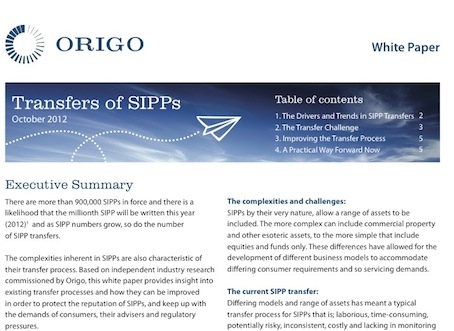E-commerce provider Origo has today published an independently-researched White Paper highlighting how the complexities of the Sipp transfer processes are hindering service to financial advisers and potentially risking the reputation of the Sipp market.
There has been a boom in Sipp business over the past few years - the millionth Sipp looks set to be written in 2012* - and this rapid expansion of the market has resulted in differing Sipp models, from the simple to the bespoke, catering for a wide range of assets, from mutual funds to commercial property.
Independent industry research, commissioned by Origo, across 15 different Sipp platforms and providers, has revealed how the numerous disparate systems and processes used in the Sipp market are affecting the quality, speed and efficiency of cash and asset transfers, which in turn affects the level of service to financial advisers and so the end consumer, according to Origo.
Paul Pettitt, managing director of Origo, said: "The FSA has stated that the transfer of assets on and off platforms must be conducted in a "timely manner". Yet our research has shown that a typical transfer process for SIPPs is laborious, time-consuming, inconsistent, costly and lacking in monitoring and service level agreements (SLAs).
"Current practices allow for inefficiencies such as manual keying of data from paper forms; double-keying to try to eliminate errors; inconsistent descriptions of funds or nominee names resulting in delays; and varying response times forcing the adviser to chase progress."
The situation is likely to get worse, says Origo. Currently, platforms and providers estimate that up to 10% of business is being transferred in or out of Sipps a year. That figure is set to rise as the focus on competition and pricing increases, providers make further inroads into the corporate/occupational pensions arena, and consolidation into Sipps continues.
In consequence, while the majority (80-90%) of pensions transfers today are in cash, principally from legacy products (personal pensions into new Sipps), it is expected that in-specie re-registration transfers between providers, which are more complex as they do not convert to cash and so keep the client invested in the market, will increase markedly.
Mr Pettitt, said: "Origo's research clearly demonstrates the requirement for action by the industry. Given the huge complexity of the Sipps market and the range of differing business models as well as systems and processes being used, there is a clear need to automate the re-registration of assets to enable Sipp platforms to meet their requirements both under TCF and the RDR."
Origo has been collaborating with the industry, including trade bodies such as AMPS (the main trade body overseeing self-invested pensions), to forge a practical way forward. Origo's says its re-registration service is able to exchange a broader set of data needed for the transfer of the full wrapper information required for Sipp transfers.
Origo is hosting a free interactive webinar on 8 November that will provide further insight into how automation and orchestration of SIPP transfers can deliver operational benefits and satisfy regulatory requirements. To register go to: http://www.origoservices.com/re-reg
(* Source: John Moret of MoretoSIPPs)

